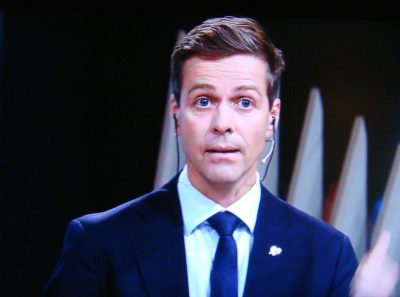Knut Arild Hareide, leader of Norway’s Christian Democrats party, has had a hard time keeping his flock together during this year’s election campaign. With his Christian constituency increasingly diverse and more willing to vote for other parties, Hareide is now grabbing what influence his party can by backing the Conservatives’ Erna Solberg as prime minister even if she forms another coalition with the Progress Party.

It was just a few weeks ago that Hareide was all but attacked by the Progress Party’s provocative politician Sylvi Listhaug, for allegedly failing to confront fundamental Muslims in Norway. Listhaug, fond of wearing a cross around her neck, has also been at the forefront of those trying to woo Christian voters, in direct competition with Hareide’s Christian Democrats (Kristelig Folkeparti, KrF). Hareide claimed earlier in the campaign that his party no longer would support a government that included the Progress Party, because their positions on key issues were simply too different.
He stepped back from that position on Thursday, telling newspaper Vårt Land that the Christian Democrats won’t actively contribute towards toppling a Solberg-led government that includes the Progress Party. “When we’ve chosen her as our prime minister candidate, it would be strange to topple her after the election, ” Hareide said, “also if she chooses to be sitting with the Progress Party.” He stressed that his party wouldn’t vow to protect a Solberg government for all four years of the next parliamentary session, “but it’s natural for her (Solberg) to continue.”
This generated headlines and topped newscasts in Norway because it can throw a bit more weight behind the emergence of a Conservatives-led government after the election, while also firmly closing the door on any Christian Democrats’ support for a Labour-led government. The two had flirted throughout the spring, to the detriment of both. The more conservative members of Hareide’s flock were strongly opposed to cooperating with Labour, while the more radical members of Labour didn’t want anything to do with the Christian Democrats. Both parties, especially Labour, are believed to have lost voters as a result.

Hareide, meanwhile, has seen his efforts to expand his party’s appeal fail badly, with newspaper Aftenposten reporting Friday that the Christian Democrats may suffer their worst election results ever. They’ve actually won government power twice within the past 20 years, with then-party leader Kjell Magne Bondevik becoming prime minister from 1997 to 2000 and again from 2001-2005. Now, instead of winning new voters like they did then, they’ve been losing voters because of what Hareide calls a more “fragmented” constituency. Some have been lured away by either Progress or more fundamentalist movements, while Christian farmers in the party’s heartland of rural counties have turned to the Center Party because of its protectionist agricultural policies. Some fundamentalist Christians opposed to gay marriage, for example, were unhappy that Hareide marched in the Pride Parade. More liberal and tolerant Christians aren’t showing any gratitude that the party helped block year-round store openings on Sundays or retain Norway’s laws against buying sexual services. Even the party’s traditionally reliance on a values-oriented campaign didn’t help this year, because an often-ridiculed “values” debate over what makes Norwegians Norwegian (goat cheese? skiing?) was mostly to the immigration issue and not to the souls of eligible voters. Election researcher Bernt Aardal has gone so far as to claim that “Christian voters” don’t exist in Norway any longer, because they prioritize different areas within Christianity itself, and have various political preferences.
Hareide told Aftenposten that he sees his biggest competitors for voters as not the Progress Party, “but the Center Party, the Conservatives and Labour, in that order.” Even Labour leader Jonas Gahr Støre has called himself a Christian (as opposed to his secular predecessor Jens Stoltenberg) and tried to appeal to Christian voters, while Norwegian society in general is less strict, more diversified and arguably more secular than it’s ever been.

As Hareide headed into the weekend, he hoped that confirming and clarifying his party’s support for a Conservatives-led government will reassure and retain the party’s more loyal voters. On Friday Hareide also launched an offensive to help underage refugees who arrive in Norway alone, and prevent their forced return at the age of 18. Newspaper Dagsavisen reported that both the Christian Democrats and the Liberals (Solberg’s other support party in Parliament) will demand that current practices ushered in by Listhaug as immigration minister from Progress will end, perhaps forcing Solberg to go along if she wants to prevent a new coalition with Progress from falling. Another new poll showed the four non-socialist parties with a majority on Friday, albeit slim.
“This all just shows it will be a very exciting election on Monday,” Solberg told Aftenposten on Friday. Perhaps too exciting for Hareide as he’s been faced with sagging polls. “Folks think you have to go prayer meetings or to church every Sunday to vote for the Christian Democrats,” he lamented to Aftenposten, claiming that isn’t so. He said he intends to continue as leader even if the party loses badly on Monday: “Then it will be more likely that I ask for continued confidence instead of resigning.”
newsinenglish.no/Nina Berglund

